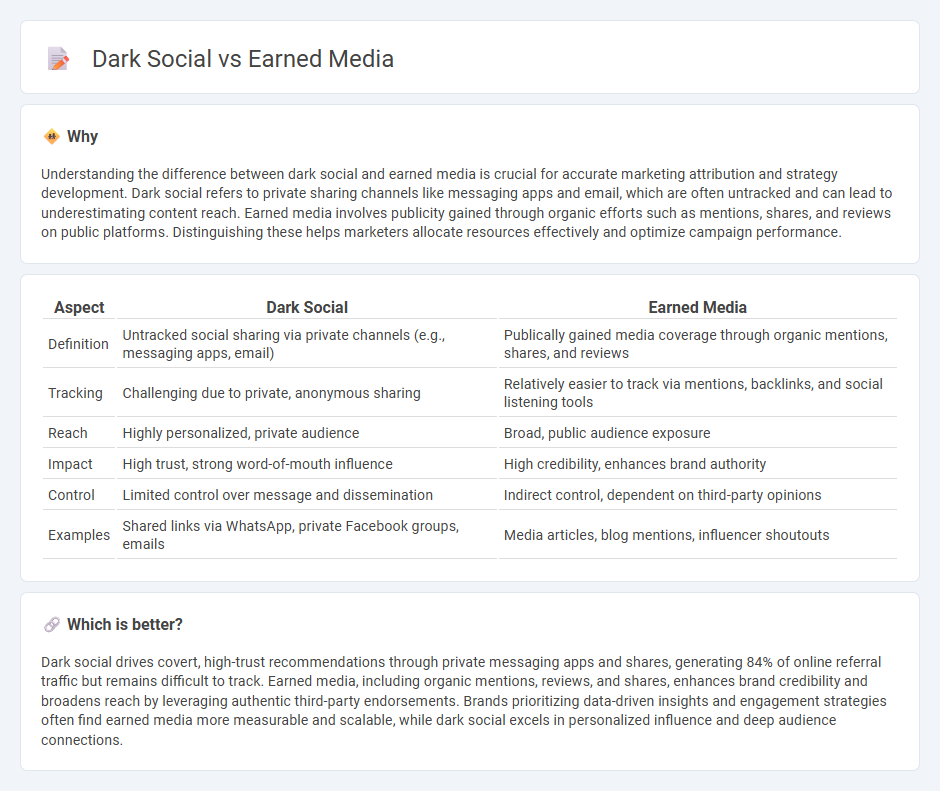
Dark social refers to the sharing of content through private channels like messaging apps, email, and private social networks, making it challenging to track and measure. Earned media involves organic publicity gained through word-of-mouth, social shares, and media coverage, offering high credibility and trust among audiences. Discover the critical differences and strategic advantages of dark social versus earned media in modern marketing.
Why it is important
Understanding the difference between dark social and earned media is crucial for accurate marketing attribution and strategy development. Dark social refers to private sharing channels like messaging apps and email, which are often untracked and can lead to underestimating content reach. Earned media involves publicity gained through organic efforts such as mentions, shares, and reviews on public platforms. Distinguishing these helps marketers allocate resources effectively and optimize campaign performance.
Comparison Table
| Aspect | Dark Social | Earned Media |
|---|---|---|
| Definition | Untracked social sharing via private channels (e.g., messaging apps, email) | Publically gained media coverage through organic mentions, shares, and reviews |
| Tracking | Challenging due to private, anonymous sharing | Relatively easier to track via mentions, backlinks, and social listening tools |
| Reach | Highly personalized, private audience | Broad, public audience exposure |
| Impact | High trust, strong word-of-mouth influence | High credibility, enhances brand authority |
| Control | Limited control over message and dissemination | Indirect control, dependent on third-party opinions |
| Examples | Shared links via WhatsApp, private Facebook groups, emails | Media articles, blog mentions, influencer shoutouts |
Which is better?
Dark social drives covert, high-trust recommendations through private messaging apps and shares, generating 84% of online referral traffic but remains difficult to track. Earned media, including organic mentions, reviews, and shares, enhances brand credibility and broadens reach by leveraging authentic third-party endorsements. Brands prioritizing data-driven insights and engagement strategies often find earned media more measurable and scalable, while dark social excels in personalized influence and deep audience connections.
Connection
Dark social channels, such as private messaging and email, are significant sources of earned media because they facilitate organic sharing of content without direct attribution. Earned media, driven by consumer trust and authentic endorsements, often originates from these private interactions, amplifying brand visibility beyond traditional public platforms. Tracking dark social engagement helps marketers measure the true impact of earned media on brand awareness and customer acquisition.
Key Terms
Organic Reach
Earned media generates organic reach through user-generated content, shares, and mentions on public platforms, amplifying brand visibility naturally. Dark social channels, like private messaging apps and email, also contribute to organic reach but remain difficult to track due to their closed, private nature. Discover how leveraging both earned media and dark social can optimize your brand's organic reach effectively.
Word-of-Mouth
Earned media encompasses public endorsements such as shares, mentions, and reviews across social platforms, amplifying brand visibility through authentic word-of-mouth. Dark social refers to private channels like messaging apps, emails, and direct messaging where organic sharing occurs but remains untrackable, representing a hidden reservoir of word-of-mouth influence. Discover effective strategies to leverage both earned media and dark social for maximizing genuine customer engagement.
Trackability
Earned media generates organic exposure through shares, mentions, and endorsements on public platforms, providing measurable metrics such as engagement rates, referral traffic, and social reach. Dark social refers to private sharing via channels like messaging apps, email, and SMS, where tracking is limited due to lack of visibility and attribution tools, posing challenges for marketers to accurately assess content impact. Discover effective strategies to enhance trackability in both earned media and dark social contexts.
Source and External Links
Earned media - Earned media is content about a person or organization published by third parties without payment, including mentions in traditional media, social media discussions, or reviews, generated through newsworthiness or relationships instead of paid promotion.
What Is Earned Media? - Earned media refers to publicity gained through unpaid means like word of mouth, social media sharing, news coverage, or online mentions, often involving journalists, influencers, or customers sharing content or recommendations.
Paid vs. Owned vs. Earned Media: What's the Difference? - Earned media is organic public exposure from customer reviews, word of mouth, social media mentions, or media coverage that companies do not pay for or own, making it highly trusted and valuable for brand credibility.
 dowidth.com
dowidth.com